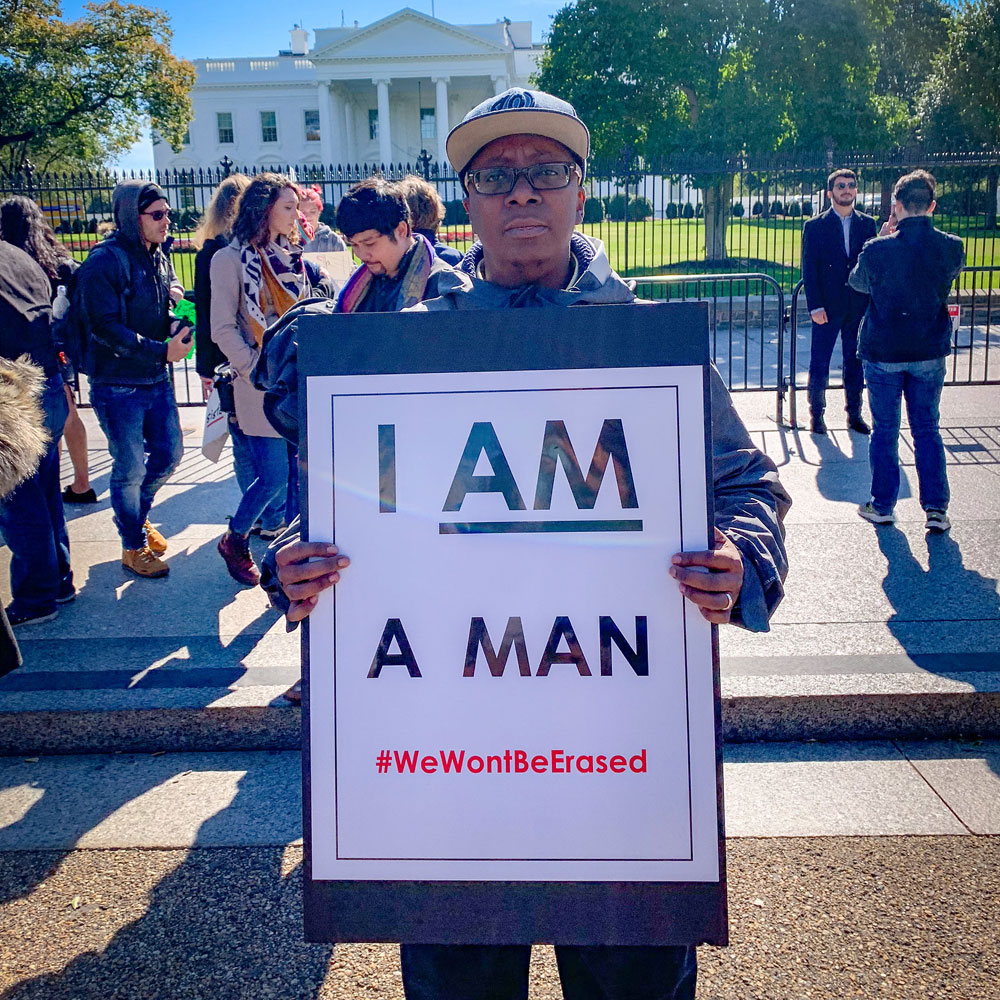
Any organizer fighting for social change will tell you: we stand on the shoulders of giants. Our ancestors—the leaders who came before us—not only offer historical wisdom but show us that change toward a more inclusive and equitable society is in fact possible.
As a trans activist working in philanthropy, I’m guided by the vision of trans women of color leaders like Sylvia Riviera and Marsha P. Johnson, who helped lead the monumental Stonewall Riots in 1969, marking the start of the modern-day LGBTQ+ movement. Neither saw the fight for queer and trans liberation as a single-issue campaign. Their intersectional activism spanned labor rights, economic justice, access to health care, and freedom from racial discrimination.
Yet as the 50-year anniversary of the Stonewall Riots passes, binary and non-binary transgender and gender-nonconforming communities in the US continue to grapple with the same issues that Sylvia and Marsha fought so hard to change. While our social movements have made strides, 15 percent of the trans population lives on less than $10,000 per year, far below the federal poverty line. When it comes to health care, at least a third of trans people report having a negative experience due to discrimination, harassment, or refusal of services. And this year’s Pride season saw 22 anti-LGBTQ+ protests and a big spike in violence. Fourteen LGBTQ+ people were murdered between May 15 and July 15, 2019, half of whom were Black trans women.
With more than one million openly trans people living in the US, we have to do better. As individuals working in philanthropy, we are uniquely positioned in the fight for social justice. Our funding and support help power social movements. Our resources can magnify impact. But to do so, we have to acknowledge and undo decades of exclusion.
Righting a Historical Wrong
For a long time, trans leaders were locked out of traditional organizing spaces, their contributions erased and ignored in the broader narrative of LGBTQ+ activism in the United States. As the mainstream gay rights movement grew (and increasingly focused on marriage equality), it also pushed trans communities to the margins, often favoring gay white men as its heroes. Transphobia, sexism, and racism meant that fewer philanthropic dollars went to meeting the survival needs of trans people.
Today, philanthropy is still catching up. Funders for LGBTQ Issues’ 2017 Tracking Report: Lesbian, Gay, Bisexual, Transgender, and Queer Grantmaking by US Foundations found that only three cents in every $100 awarded by foundations focuses on trans communities. While funding for trans communities in the US has increased fourfold in the last five years, as of 2017, it still totals less than $23 million a year. This is despite the fact that many of the issues our institutions fund, from criminal justice reform to health care, still disproportionately impact trans people.
While trans people remain underrepresented in—and underfunded by—foundations, too often grantmakers expect the story of LGBTQ+ organizing to conform to a particular ideal of what social change should look like and who is supposed to lead. What is the theory of change? What are your impact metrics? Are you running a campaign, program or project? Questions like these may fill out a grant application, but they still overlook the innovative and imaginative work trans leaders are doing in their communities.
The Fund for Trans Generations
At Borealis Philanthropy, we have started to make a dent with efforts like the Fund for Trans Generations (FTG), which was established to ensure that frontline trans activists and organizations have the financial resources needed to advance the safety, security, and rights of trans people. FTG directly centers the leadership of transgender and gender-nonconforming communities: all staff are trans people of color who have experience organizing at the intersections of racial and gender justice. The Fund is also overseen by an advisory committee that includes five trans activists and organizers.
Since its launch in 2017, FTG has provided $1.9 million in general operating support grants, rapid response funding, and coaching and capacity-building resources to trans-led organizations—all of which have budgets of less than $250,000. We trust and support the leadership of trans people to know what they need resources for. To date, we’ve seen a number of our grantees secure their first community/office space, hire their first staff member, and host healing and wellness retreats. Flexible coaching support that grantees can decide how to use has helped organizations establish shared decision-making structures, launch fundraising campaigns and build relationships with donors, and strengthen their financial management practices.
Sign up for our free newsletters
Subscribe to NPQ's newsletters to have our top stories delivered directly to your inbox.
By signing up, you agree to our privacy policy and terms of use, and to receive messages from NPQ and our partners.
One ongoing need that grantees have named is having a permanent physical home. The importance of these spaces cannot be understated in the current political and economic climate, where gentrification, violence, and harassment severely limit who has access to public space.
But one institution is not enough to make lasting change. It’s on all of us to transform the ecosystem of philanthropy and move the needle on trans rights. That is why in March of this year, Borealis Philanthropy joined with over 30 (now over 40) other foundations to launch the historic Grantmakers United for Trans Communities (GUTC) Pledge, a commitment to be more trans-inclusive in grantmaking and internal practices. The GUTC pledge offers a blueprint for how we can spark a new movement in philanthropy.
A New Movement in Philanthropy
The GUTC Pledge is an outgrowth of the GUTC Initiative at Funders for LGBTQ Issues, an association of foundations committed to increasing resources for LGBTQ communities. The pledge was designed by funders, for funders, to support and learn from some of the most impactful work in our country—led by trans leaders.
First, the Pledge calls on grantmakers to make a commitment to learning. As people working in philanthropy, one of our greatest assets is getting to hear from people who are doing work on the ground. As such, GUTC is creating opportunities for grantmakers to access trainings and resources that center the wellbeing of trans communities and the leadership of trans people.
Second, we must improve the staff recruitment and retention of transgender people, nonbinary people, and others who don’t conform to the gender assigned to them at birth. Through institutional changes, such as ensuring your employee health insurance coverage is fully inclusive of the needs of trans people, employers can go a long way to improve retention.
Third, it is imperative to increase funding to groups that serve trans communities, especially ones led by trans leaders. Out of the 600 trans grassroots groups that the Trans Justice Funding Project has identified, most are operating on budgets of less than $100,000, while tackling critical community needs. Meanwhile, according to available data, only five trans-focused and trans-led organizations in the entire country have annual budgets over $1 million. That is why the Pledge is asking grantmakers to take initiative and share their request for proposals with eligible trans organizations, while reconfiguring internal processes to reduce administrative burden in the application process.
Finally, the Pledge calls on all funders to offer public support to trans communities and demonstrate real solidarity. In the past few months, the Trump administration proposed a change to the Section 1557 of the Patient Protection and Affordable Care Act, which had previously protected LGBTQ+ people against discrimination in healthcare settings. As a funder supporting trans-led organizing, we responded to the call to submit public comment in opposition to these changes because it was an important opportunity to publicly show support for the health and wellbeing of all LGBTQ+ people, as well as immigrants and anyone seeking reproductive health.
As funders, sign the GUTC Pledge, but please don’t let the work stop there. It’s time to transform our institutions from the inside out. Let us dare to imagine a world where trans people are free. Because when we do, we are building a world where every single one of us can thrive.








